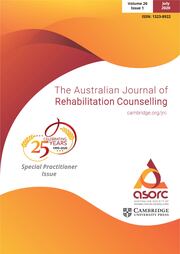Article contents
The Role of the Rehabilitation Provider in Occupational Rehabilitation: Providing for Whom? Part 2: Perceptions of Key Stakeholders
Published online by Cambridge University Press: 27 August 2015
Abstract
This paper is the second part of a two part series that examines the perceived roles and effectiveness of rehabilitation providers. The first paper examined the perceptions of rehabilitation providers regarding their roles in, and perceived barriers to, occupational rehabilitation. In this paper, key stakeholders' perceptions of the role of rehabilitation providers in the management of workplace injury were assessed via interviews and surveys. Forty-nine injured workers were interviewed and 407 returned a survey questionnaire. Two surveys of employers were conducted: one in the Newcastle/Hunter region of NSW, Australia (N = 93), the other a state-wide survey (N = 612) of a representative sample of employers in NSW. In addition, nine treating doctors and 14 insurers were interviewed. Results indicated that two thirds of workers were satisfied with the service they had received from the rehabilitation provider. The major concerns of injured workers were the rehabilitation providers' lack of knowledge of the demands of particular workplaces, the problems associated with particular injuries and the pressure on rehabilitation providers from employers and insurers to return the injured worker to work. Sixty percent of employers reported that rehabilitation providers were effective in restoring injured workers to work. Treating doctors were generally hostile to rehabilitation providers, claiming that they were unprofessional, inexpert and poorly trained. Finally, insurers complained of stereotypical case management plans, role confusion, and over-servicing.
- Type
- Articles
- Information
- Copyright
- Copyright © Cambridge University Press 1998
References
- 4
- Cited by


